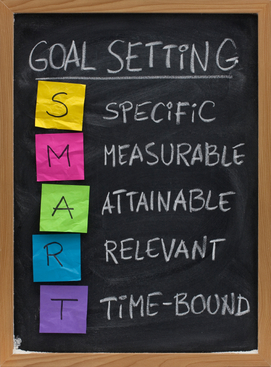 Did you know that in experiments with lab rats, scientists found that when rats are running towards food, they run faster as they get closer to the food? Source: 'Brainfluence' by Roger Dooley. What does this mean for you? If you give yourself short-term goals and rewards, you will work towards them with more zeal and enthusiasm than longer term goals. For your goals to be meaningful you need to make sure they are SMART: · Specific · Measurable · Attainable · Relevant · Time-specific SPECIFIC "I will start writing a book" is not a specific goal. "I will start writing a book on saving and I will finish it within 6 months" is a specific goal. You can make it even more specific by stating how many words or chapters you will write per week, e.g. 2,000 words per week. What is your specific goal? MEASURABLE Measurability is all about being able to account for whether or not you have made progress. Continuing with the example of writing a book, if a month later you have only written 4,000 words then you can say you are running two weeks behind schedule. How are you going to measure your goal or goals? ATTAINABLE If you set a goal that is very hard to achieve you'll probably give up. For example, "I will go to the gym every day," is probably not an attainable goal if you work 5 days a week. "I will write 1,000 words every day," is also not attainable if you have a full-time job. It is very hard to write 1,000 good quality words in one evening after a hard day at work. Is your goal overambitious? Can you achieve it without feeling like you are suffering or giving up too much? RELEVANT In my opinion this is the least important criteria in the SMART schema. Relevance is about focus. A goal should fit within a bigger picture objective. For example, if your goal is to be a world class writer then having the goal to play 5 games of chess a week for a year may be Specific, Measurable, Attainable and Time-specific but it probably isn't relevant to being a writer. It might be relevant to your relaxation goals but it certainly isn't relevant to writing. Are your financial goals relevant? TIME-SPECIFIC A goal means nothing if it doesn't come with a deadline. Deadlines are crucial when it comes to achievement. Due to circumstances you might have to adjust your deadline but not having a deadline to begin with is pure folly. Are your personal financial goals SMART? Your financial goals do not have to directly involve “making money” right now. Just make sure you incorporate the SMART format. Financial goals can include: · Projects that may lead to money in the long run (e.g. learning a new skill). · Saving targets (e.g. making your own to take work so that you don't have to spend money buying lunch from restaurants). · Getting into the habit of writing shopping lists so that you don’t buy things you don’t need. · Budgeting. As you create your goals think through the following: · How do you waste money on a weekly basis? · What financial bad habits would you like to get rid of? · What things do you spend money on that you can do without? SMART goals in other areas of your life You can apply the SMART system to any goal system. I’ve found that when my goals are not smart I am less successful. For instance, I set out to lose 3kg in Jan-2013. Result? By Dec 2013 I had gained 5kg! The goal was not SMART. So, in Jan-14 I set some weekly targets and rewards and I have already lost 3kg! I love SMART goals. “Goals are dreams with deadlines." Diana Scharf For inspirational quotes follow @Getting2Wealthy on twitter.
0 Comments
Leave a Reply. |
For 2 years until early 2014 I wrote a weekly personal finance and business column for Malawi's leading media house, The Times Group. The target is middle-class, working African women.
This is a reproduction of the articles that appeared in the weekend edition of Malawi News. Categories
All
Archives
May 2014
|
Heather Katsonga-Woodward, a massive personal finance fanatic.
** All views expressed are my own and not those of any employer, past or present. ** Please get professional advice before re-arranging your personal finances.

 RSS Feed
RSS Feed



